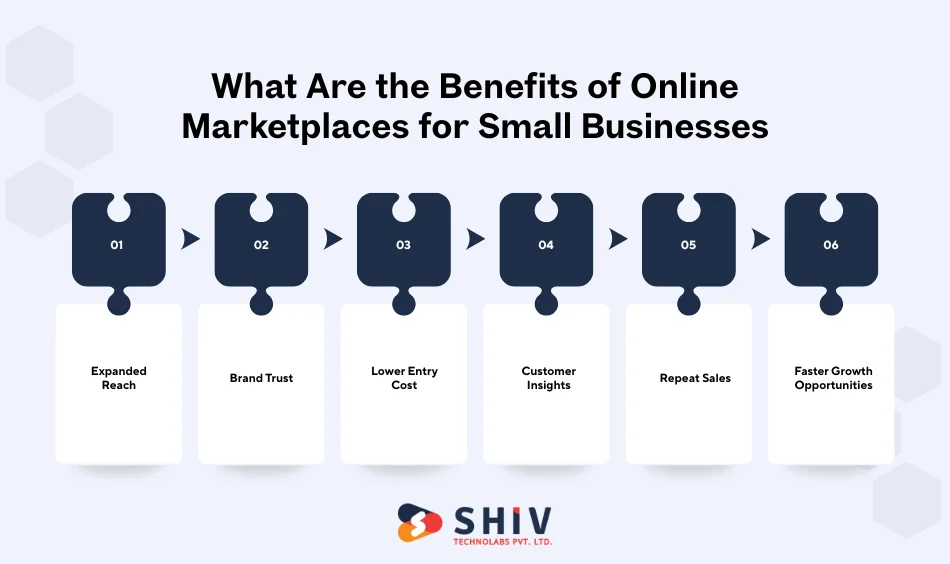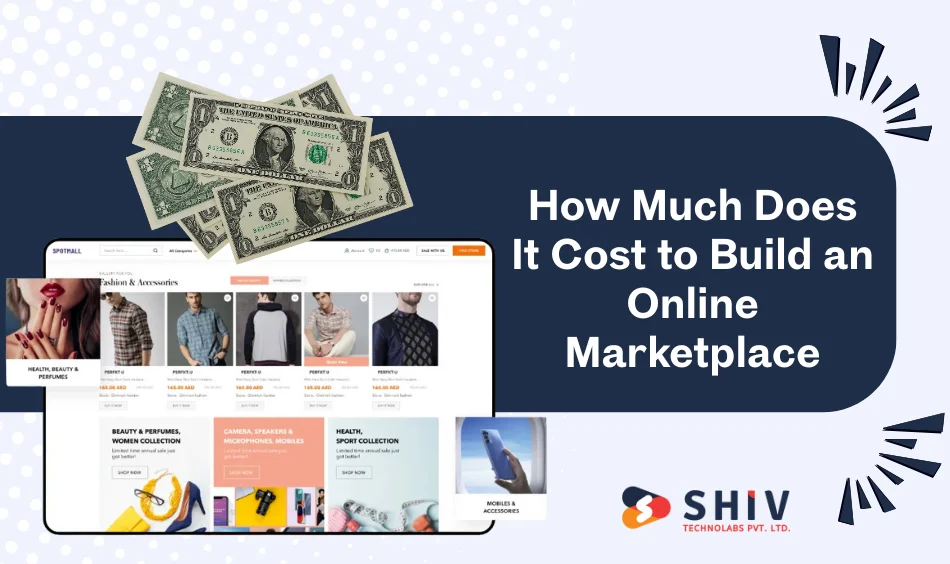Table of Contents
Small businesses today face big changes in how they sell products and find customers. More people shop online now than ever before. An online marketplace for small business gives businesses a platform to sell without developing their own websites from scratch. These platforms already have customers looking for products.
Business owners with limited knowledge about technology can collaborate with expert developers for ecommerce marketplace solutions, which allows them to sell their products online via the online marketplaces. This removes many problems that previously prevented small businesses from selling online.
Small businesses that use marketplaces in 2025 grow faster than those with their own websites only. Small business marketplace apps help them sell more and increase their visibility to a wider audience. Customers also trust businesses more when they sell on well-known marketplaces.
Using marketplaces does more than just increase sales. It helps businesses build their reputation and keep customers coming back. Smart business owners know this is one of the best ways to grow their companies today.
Why Are Online Marketplaces Important for Small Businesses
Small businesses usually lack a competitive edge over large companies. Online marketplaces solve this by offering everybody the same opportunities to succeed. Small companies can now access customers from around the world without investing large amounts of money into advertising and complex shipping systems.
Broader Audience Access
Marketplaces already have millions of people shopping on them every day. Small businesses can sell to these customers right away. They don’t need to spend months trying to get people to visit their websites. The customers are already there, looking for products to buy.
Built-in Trust and Credibility
People are more comfortable purchasing from websites they are familiar with and regularly visit. When small businesses sell on established marketplaces, customers are less concerned about being scammed. This increases the possibility of people purchasing products from brands they previously had never heard of.
Simplified Operations
These platforms take care of all the hard parts of selling online. They handle payments from customers and help with shipping. They also figure out taxes automatically. This allows business owners to spend more time creating high-quality products and assisting customers, rather than dealing with technical issues.
What Are the Benefits of Online Marketplaces for Small Businesses

The use of online marketplaces by small businesses can yield significant benefits. These benefits enable them to develop more quickly and earn a higher income. Below are the benefits of online marketplaces for small businesses
Expanded Reach
Companies can sell their products to people in other cities or even countries. They don’t need to open physical stores in different places. One online store can reach customers everywhere.
Brand Trust
New businesses often have trouble getting people to trust them. Marketplaces already have good reputations. When small businesses sell on these platforms, customers trust them more quickly because they trust the marketplace.
Lower Entry Cost
Building a website and all the systems needed to sell online costs a lot of money. Joining a marketplace costs much less. Small businesses can start selling right away without spending thousands of dollars first.
Customer Insights
Markets give feedback on things that customers prefer and their shopping behaviors. This information assists businesses in knowing their customers. This information will enable them to produce better products and to increase their sales.
Repeat Sales
These platforms have special programs that encourage customers to buy again. They recommend products to customers and offer rewards for buying multiple times. This helps businesses keep customers coming back.
Faster Growth Opportunities
Marketplaces allow the company to advertise itself and track its performance. Sales and promotions can be easily organized by them. These characteristics can make the businesses expand much quicker than they would independently.
How Do Small Businesses Grow Online Through Marketplaces
Marketplaces don’t guarantee instant success, though. It’s not an easy task for businesses to get noticed and make a sale.
Listing Optimization
The products also need to have good quality images and descriptions so that they can be found in search. These titles must include words that are used by customers when they search for products. Placing products in the correct categories will also help people find products.
Customer Reviews
Getting positive reviews from customers is very important. Reviews influence other customers to make purchases. They also improve the ability of products to appear higher in search results on the marketplace.
Competitive Pricing
Thus, companies should keep an eye on what other sellers charge for comparable items. They need to set their prices so that they will remain competitive and still make money. Some brands adjust their prices, usually depending on the actions of the competitors.
Loyalty Programs
Using the marketplace’s reward systems keeps customers interested. Special deals for repeat customers make people want to buy again. These programs work well for building long-term relationships with customers.
Also read: How to Create a Marketplace Website: A Complete Guide
What Are the Best Online Marketplace Platforms for Small Businesses
Different marketplaces work better for different types of businesses. Here are the top choices for small businesses in America.
| Platform | Best For | Cost | Unique Feature |
|---|---|---|---|
| Etsy | Handmade & creative goods | Listing fees + 5% commission | Niche audience & creative community |
| Amazon Marketplace | Broad e-commerce reach | Subscription + referral fees | Prime access & fulfillment support |
| eBay | Auctions & used items | Listing fees + final value fee | Bidding system & global exposure |
| Walmart Marketplace | Retail & mass-market | Referral fees only | Large U.S. customer base |
| Poshmark | Fashion & second-hand | Commission on sales | Social commerce & community engagement |
| Facebook Shops | Social media sellers | Free (optional ads) | Direct social media integration |
What Is a Multi-Vendor Marketplace Platform and Why Does It Matter
A multi-vendor marketplace platform allows multiple sellers to use the same website. This gives customers more products to choose from in one place. It also helps the marketplace owners make more money because they have more sellers. Below are key features of multi-vendor marketplace apps:
- Seller control panels help vendors manage their products and orders easily
- Stock tracking systems keep track of how many products are available
- Automatic payment systems split money between the marketplace and sellers
- Reports show how well products are selling and what customers like
- Review systems let customers rate products and sellers
- Commission settings let marketplace owners control how much they earn
- Different shipping options give sellers flexibility in how they send products
How Much Does It Cost to Build an Online Marketplace

The cost to build a marketplace depends on what features you want and how big you want it to be. Simple marketplaces cost less than complex ones with many special features.
Factors That Decide Marketplace Platform Pricing
- Features like chat systems, review sections, and reward programs cost extra money.
- More complex designs that look better and work smoother also cost more.
- Marketplaces that need to handle lots of users or sellers in different countries cost more to build.
- Adding connections to payment systems, business software, and tracking tools increases costs.
- Making sure the marketplace follows all laws and works for people with disabilities also affects the price.
| Cost Range | Features Included | Timeframe |
|---|---|---|
| Small MVP Marketplace | Basic product listings, checkout, payments | 2–3 months |
| Full-Scale Marketplace | Multi vendor support, analytics, loyalty | 6–12 months |
The final cost depends on what the business needs and how fancy they want their marketplace to be.
What Ecommerce Marketplace Solutions Are Available for Small Businesses
Small businesses have a chance to enter the existing marketplaces such as Amazon or Etsy. They are also able to create their own custom marketplaces in case they desire greater control. Both alternatives can assist companies in selling online, taking orders, and communicating with customers.
Special features such as different languages, unique reward programs, and detailed sales reports can be customized on marketplaces. These aspects contribute to the distinctiveness of businesses.
Why Do Startups and SMBs Prefer Marketplace Platforms Over Standalone Apps
Small businesses and new enterprises tend to use marketplaces rather than develop their own applications. This is due to the fact that markets are quicker, cheaper, and more convenient to operate.
Key Advantages
- Getting started takes less time because everything is already built
- Access to customers who already shop on the platform increases sales
- Built-in advertising tools help promote products without extra work
- Easy to add more products or sellers as the business grows
These benefits explain why new businesses choose marketplaces when they want to start making money quickly.
What Is the Role of B2B Marketplace Platforms in Small Business Growth
Business-to-business marketplaces assist businesses in selling to related businesses rather than ordinary consumers. These platforms bridge the gap between suppliers and buyers, facilitating the handling of bulk orders. Here are the key benefits of b2b marketplace platforms:
- Make it easier to order large quantities of products for businesses
- Give detailed information about specific industries through platforms like Alibaba
- Help businesses find reliable suppliers and build good relationships
- Provide reports and data that help businesses make smart decisions
B2B marketplaces help small businesses save money and find corporate customers who buy in large amounts.
How Can Small Businesses Choose Between Platforms and Custom Solutions
Deciding between ready-made marketplaces and custom development depends on what businesses need and how much they want to spend.
| Option | Flexibility | Cost | Scalability |
|---|---|---|---|
| Ready-made Marketplace Platform | Moderate | Low | Limited |
| Custom Marketplace Development | High | Medium-High | Fully scalable |
Custom solutions give businesses complete control over how their marketplace looks and works. Ready-made platforms are more rapidly implemented and cheaper initially.
Conclusion
Online marketplaces provide small businesses with everything they need to succeed. They have access to customers, generate trust, and are less expensive compared to developing separate websites. The right marketplace and good development help can make small businesses grow faster than ever before.
Shiv Technolabs is a leading marketplace app development company that provides comprehensive marketplace app development services to businesses. We assist in selecting the right platform, creating custom features, establishing multiple sellers as well and offering continuous support. Through our experience, small businesses can start selling quickly, increase sales, and expand over time. Working with Shiv Technolabs gives small businesses the confidence to use online marketplaces effectively and see real results.
Contact Shiv Technolabs today to build your custom marketplace or join leading platforms and unlock your business’s full potential.
FAQs
Q1. What are the top benefits of online marketplaces for small businesses?
Online markets assist small business establishments to access a larger number of customers, less money to start up, and gain client trust in a short period of time. They provide valuable data on what customers desire, generate the chance to make a repeat purchase, and assist companies to expand without investing much in their own e-stores.
Q2. How much does it cost to start selling on marketplace platforms?
Prices involve the charges to use the platform, percentages on each sale, monthly subscriptions, the charges to promote, and in some cases, the custom development work. A simple online store can be started at just a few hundred dollars, whereas a full-fledged custom marketplace can cost thousands and tens of thousands, depending on desired features.
Q3. Which marketplace platforms are best for small businesses in the USA?
Etsy, Amazon Marketplace, Walmart Marketplace, eBay, Poshmark and Facebook Shops suit the various kinds of businesses. These platforms contain numerous customers, contribute to trust development, simplify operations, and offer special tools to various types of products.
Q4. What features should I look for in a multi vendor marketplace app?
Essential ones are seller control, inventory, commission, split payment, sales analytics, customer reviews, and option to use a loyalty program. These characteristics ensure that a number of sellers are well organized and customers have a pleasant shopping experience.
Q5. Do B2B marketplace platforms also benefit small businesses?
Yes, business-to-business systems allow suppliers to have links with purchasers, manage huge orders, and offer knowledge in the industry. They simplify the identification of suppliers, provide comprehensive sales information and assist small businesses to connect with corporate buyers who purchase in bulk and form long-term business partnerships.






















